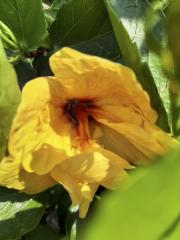
Stephen F. Austin State University’s Dr. Reuber Antoniazzi, visiting professor of forest wildlife management, and SFA forestry doctoral student Tatiana Suarez Joaqui joined more than 70 ecologists from across the globe to assemble a critical data set of pollinator and plant interactions during the 2020 COVID-19 lockdown. The data collected, recently published in the Journal of Pollination Ecology, will assist future pollinator research and conservation.
The results of the project, initiated by Dr. Jeff Ollerton, a leading pollinator researcher based in Denmark and the United Kingdom, were recently published in the Journal of Pollination Ecology, and will aid researchers in better understanding the role private gardens play in conserving insect pollinators.
At the time of data collection, Antoniazzi and Suarez Joaqui lived in Xalapa, the capital city of Veracruz, Mexico.
“Researchers took data across the world in rural, suburban and urban areas,” Suarez Joaqui said. “We were located in an urban area, but we were in a place full of plants.”
Suarez Joaqui and Antoniazzi followed methodology established by the project leader, walking around their garden at established intervals and taking precise notes of pollinator species, flower species being visited, as well as the frequency of visitation.
“A very important thing in science is following protocols,” Antoniazzi said. “When collaborating with researchers from around the world with different skills and knowledge, it’s very important to have some limits to make this data possible to compare or to test interesting stuff like the effect of increased urbanization on pollinator populations or how temperature affects them.”
Although the data collection process was strictly scientific in context, the couple agree that regular exposure to their garden and having a sense of purpose during the pandemic was beneficial to their mental health.
“It was a very distracting activity, and you were learning and engaged with the animals,” Suarez Joaqui said.
Amid the isolation of the pandemic lockdown, Suarez Joaqui admits she regularly spoke to the pollinators during data collection.
“You didn’t have anyone else to talk to, so I was like, ‘Hey, what are you doing today? You look so beautiful. You’re a new species for my sampling — let me see you closer,’” Suarez Joaqui said with a laugh.
Mental health benefits aside, the results of the research provide substantial value to the scientific community. In total, participants collected 25,174 unique pollinator and plant interactions across more than 1,000 plant and 650 pollinator species.
Antoniazzi explained that open access to scientific data sets is increasingly important because it allows scientists to reproduce studies and continue to ask broader scientific questions.
“Big data sets are important because you can compare how processes, such as floral visits or pollination, are occurring across regions,” Suarez Joaqui said. “I think this can bring a lot of new questions to science. For example, how a widespread species is interacting with plants and other ecological factors across the globe, such as Apis mellifera, the western honeybee.”
Current research indicates pollinator diversity and abundance have declined in some parts of the world, largely driven by a number of factors, including land use change.
“One big thing we’re discussing is the importance of insects for ecosystem services,” Antoniazzi said.
Antoniazzi explained that ecosystem services are the goods and services provided by the natural environment that make human life possible. This includes clean air, water and pollination.
“Pollinators transfer pollen from one flower to another, making it possible for the flowers to produce fruits,” Antoniazzi said. “Without pollinators, we don’t have fruits. That’s very impactful for us, because if we don’t have fruits, we don’t have things we usually eat.”
Underscoring the importance of pollinators, Antoniazzi and other researchers organized a special symposium focused on insects that will take place at The Wildlife Society’s 2022 conference this November in Spokane, Washington.
“I think more individuals who are usually most interested in game animals are now turning their eyes to animals like pollinators,” Antoniazzi said. “They are very important in terms of the ecosystem services they provide, and they can alter the trophic relationships of all ecosystems we live in.”
As researchers move forward addressing current ecological trends, Antoniazzi and Suarez Joaqui stress the importance of scientific collaboration, as illustrated by this project.
“Collaboration is key in science,” Antoniazzi said. “When you work together it’s better in terms of what you can achieve.”
To learn more about this and other research, visit sfasu.edu/atcofa.
Story by Sarah Fuller, outreach coordinator for Stephen F. Austin State University’s Arthur Temple College of Forestry and Agriculture. Contact information: (936) 468-1185 or fullersa@sfasu.edu.



